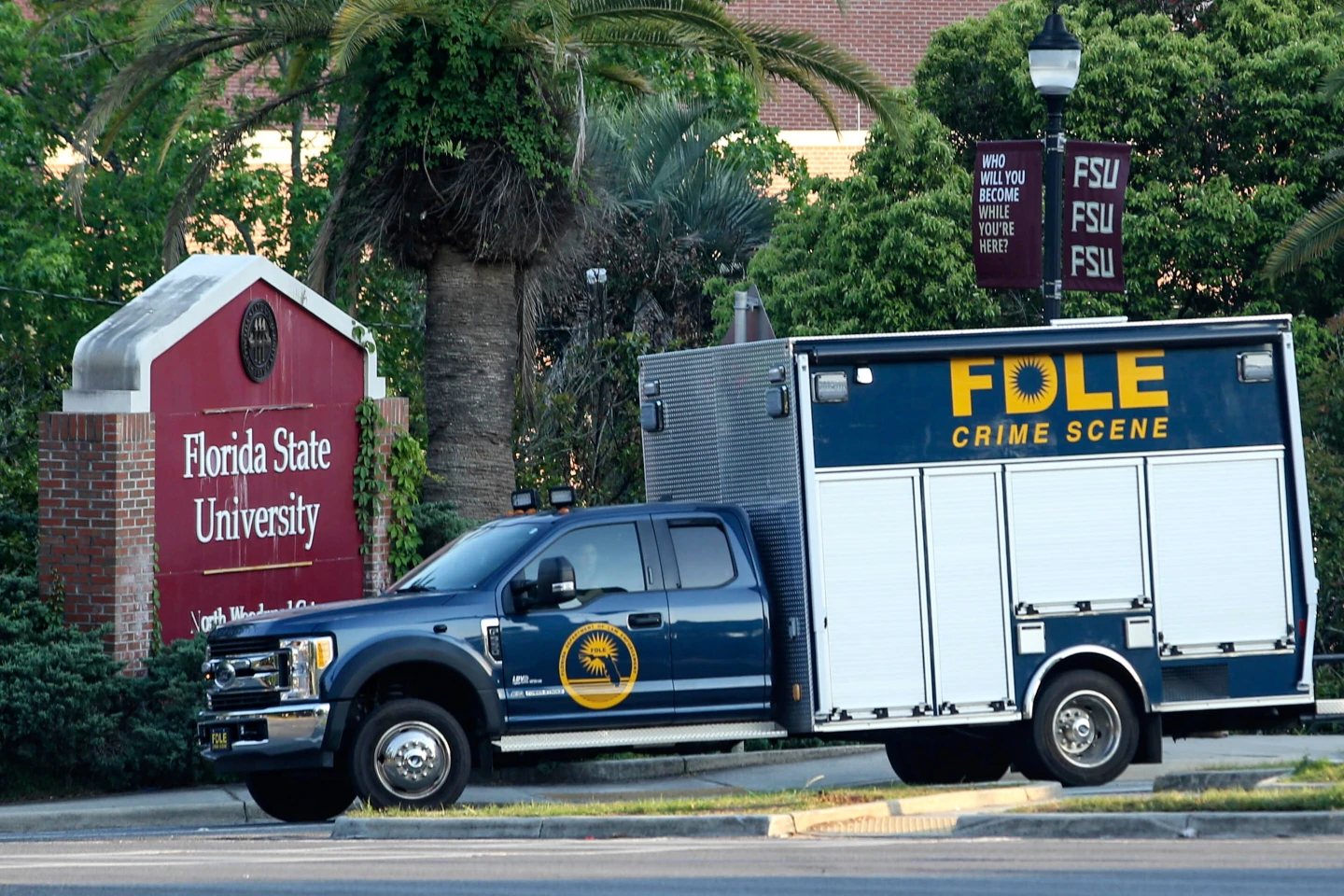Amid the abandoned chemistry notes and other debris left behind after a deadly shooting at Florida State University are lingering questions about how the stepson of a beloved sheriff’s deputy tasked with school safety at a middle school became the accused gunman.
Political science student Phoenix Ikner was a long-standing member of a sheriff’s office youth advisory council and was steeped in the family-like culture of the agency. When officers rushed to the university’s student union on reports of gunfire, authorities say it was the 20-year-old who used his stepmother’s former service weapon to open fire, killing two men and wounding six others.
As people fled in terror, Ikner was shot and taken into custody. He invoked his right not to speak to investigators, and his motive remains unknown as he lies in a hospital bed.
The prosecutor’s office is weighing possible charges as stories emerge about a darker side. One classmate recalled him being kicked out of a student club over comments that other members found troubling.
“This is horrific,” Jimmy Williams, the chief of safety for Leon County Schools, said of the shooting. “This is a horrible, horrible event.”
Williams, who has known Ikner’s stepmother, Jessica Ikner, for a decade, said the allegations underscore that “none of us are immune to tragedy.”
Classes and business operations will resume Monday, Florida State announced over the weekend.
“I know it won’t feel like a normal week,” FSU President Richard McCullough said in message to students and employees Saturday. “It’s the last one before finals, and many of you are still processing what happened. Please take care of yourself.”
His stepmother, whose own alma mater is Florida State, was reassigned from her position as a school resource officer Friday and granted the personal leave she requested, a sheriff’s office spokesperson told The Associated Press.
When the alert went out of an active shooter at Florida State University, Jessica Ikner was on duty around 2 miles (3.2 kilometers) away at Raa Middle School. A sheriff’s office spokesperson said Jessica Ikner worked to secure the campus to prevent anyone from entering as Raa went into “lockout mode,” along with all of the county’s public schools. She was practiced at this work.
Last year, she was named an “employee of the month” by the sheriff’s office, where she has worked for 18 years.
Police said they believed Phoenix Ikner shot the victims using his stepmother’s former service handgun, which she had kept for personal use after the force upgraded its weapons.
Leon County Sheriff Walter McNeil described Phoenix Ikner on Thursday as having been “steeped in the Leon County Sheriff’s Office family” and engaged in a number of sheriff’s office training programs, adding that it wasn’t a surprise that he would have access to guns.
There was no record of him having a criminal record. And in Florida, training and a background check are not required to carry concealed guns in public.
When Ikner was a child, his parents were involved in several custody disputes with his biological mother, court records show.
In 2015, when he was 10, his biological mother, Anne-Mari Eriksen, said she was taking him to South Florida for spring break in 2015 but instead traveled to Norway. After returning to the U.S., she pleaded no contest to removing a minor from the state against a court order and was sentenced to 200 days in jail. She later moved to vacate her plea, but that was denied.
In the fall of that same year, Eriksen filed a civil libel-slander complaint against Jessica Ikner, along with several other family members. The complaint, which was later dismissed, accused them of harassing Eriksen and abusing Ikner’s position at the sheriff’s office.
In 2020, at age 15, the suspect received court approval to change his name from Christian Eriksen to Phoenix Ikner, court documents show. His old name was a constant reminder of a “tragedy” he suffered, in the words of administrative magistrate James Banks, who approved the request, NBC News reported.
Banks observed that Ikner was a “mentally, emotionally and physically mature young adult who is very articulate” and “very polite” and said he chose the new name as a representation of “rising from the ashes anew.”
Reid Seybold and his classmates were working on a group project in a building located a short, three-minute walk from the student union when someone ran in and warned them about the gunfire. They huddled together, the 22-year-old said, frantically firing off what they thought might be their final text messages to loved ones.
When Seybold found out who the suspect in the shooting was — that it was someone he knows — he was overcome with anger. Seybold was the president of a club that Phoenix Ikner joined when they were both studying at the local community college, now called Tallahassee State College.
“He would complain about Black people pretty regularly, especially when conversations of police brutality would come up,” Seybold said.
Seybold said Ikner was known for espousing racist and white supremacist views that so alienated other members that the club asked him to leave the group.
“He made people that uncomfortable,” said Seybold, who now also is studying political science at Florida State. “I personally know him to have complained about how multiculturalism and communism are ruining America.”
A key part of the investigation will likely focus on what might have led to what experts call the “pathway to violence,” said Kenneth Trump, president of National School Safety and Security Services, a Cleveland-based consulting firm.
“The question is, what was the motivation, what was the grievance?,” said Trump, who wrote the book “Practical School Security: Basic Guidelines for Safe and Secure Schools.” (He’s not related to the U.S. President).
“Usually, they build up over time through some type of grievance against people,” Trump said. “The questions in the upcoming days are, were there warning signs, what were those warnings signs, and if they were there, who knew?”
Ikner transferred to Florida State after earning an associate degree at the community college, school officials said.
He didn’t attract the attention of the school paper, other than commenting in a FSU story about a rally on campus against President Donald Trump.
Ikner, a registered Republican, described the protesters as “entertaining” because Trump was already set to be inaugurated. The comments have since been removed from the story, an editor’s note saying the move was to “avoid amplifying the voice of an individual responsible for violence.”
Before Ikner’s Instagram was taken down, his bio quoted a verse from the Old Testament book of Jeremiah. “Thou art my battle ax and weapons of war: for with thee will I break in pieces the nations, and with thee will I destroy kingdoms,” reads Jeremiah 51:20, which scholars have interpreted to depict God’s judgment on Babylon. The empire is a symbol in the Bible of sinfulness and immorality.
A Tallahassee Police Department patrol car was stationed Thursday evening near the street where the family lives, blocking reporters from approaching the family’s home in a well-kept suburban neighborhood on the city’s east side.
Phone messages left for Jessica Ikner at a number listed for her on a school resource website and another phone connected to her through public records were not immediately returned Friday. And a sheriff’s office spokeswoman said she is not aware of the family putting out a statement or having a family spokesperson.
The only insight comes from the past statements. Nearly a decade ago, Jessica Ikner wrote a story posted on the Tallahassee Family Magazine website about children’s safety while surfing the internet, including tips to strengthen family bonds.
“Build a trusting relationship with your child,” she wrote. “Let them know that if they do make a mistake they can still come to you about anything.”
___
Republished with permission of The Associated Press.
Post Views: 0

 Entertainment8 years ago
Entertainment8 years ago
 Politics8 years ago
Politics8 years ago
 Entertainment8 years ago
Entertainment8 years ago
 Entertainment8 years ago
Entertainment8 years ago
 Tech8 years ago
Tech8 years ago
 Tech8 years ago
Tech8 years ago
 Tech8 years ago
Tech8 years ago
 Politics8 years ago
Politics8 years ago












